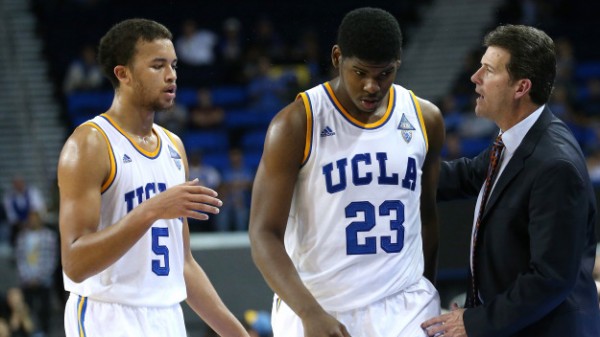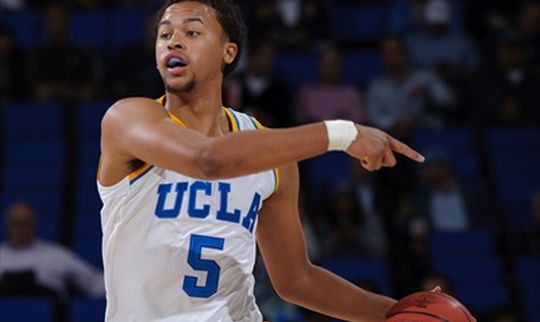UCLA Needs to Answer Some Defensive Questions In Order to Meet Its Potential
Posted by Andrew Murawa (@amurawa) on December 5th, 2013When UCLA was dominating the then Pac-10 and reeling off three consecutive Final Four appearances under Ben Howland, it did so largely on the strength of defense. Not that the Bruins’ offense wasn’t strong as well, but for those three years, UCLA ranked in the top five nationally in defensive efficiency (according to KenPom). When the wheels first came off the bus under Howland beginning in 2009-10, the complete inability of UCLA to stop anyone was largely the culprit (although, really, that team was awful on both ends of the court). Since that year, while the team’s defense has certainly improved to respectable levels, they’ve never approached elite on that end of the court. Although, really, for that matter, they’ve not been elite on either end of the court.
This season? It still remains to be seen how this will all shake out as UCLA’s schedule ramps up soon, but at this early point it appears that the Bruins will be one of the better teams in the nation at putting the ball in the basket. They’ve got a bevy of shooters, plenty of athletes, a savvy play-maker in Kyle Anderson, and some serviceable big guys. Thus far, they’ve been ridiculously exciting — and efficient — on the offensive end, but for this team to challenge Arizona for a Pac-12 title, a solid defense needs to be a part of the equation.
For 20 minutes or so on Tuesday night, as UC Santa Barbara dropped nine of its first 14 three-point attempts on the way to a halftime tie of 42-all, those same questions about the quality of UCLA’s defense that we’ve had the past four years began to creep back. There were Gauchos leaking out unhindered for uncontested fast break points, deadly three-point shooters getting lost for easy looks in the halfcourt game, and UCLA defenders getting beaten off the bounce. Some of these things were tightened up considerably in the second half (although UCSB still scored better than a point per possession), but as UCLA heads into a stretch where they’ll play Missouri and Duke in two of its next three games and with conference play not all that far into the distance, just how good can this UCLA team be on the defensive end?
Well, for starters, it is really interesting that head coach Steve Alford went to great lengths to praise the play of sophomore center Tony Parker in the second half of that UCSB game. You see, Parker picked up two quick fouls in the first half (really quick, as Parker drew fouls on each of the first two times that UCSB’s big man Alan Williams touched the ball), and never came back in. But over the course of the 16 minutes Parker played in the second half, he only drew one additional personal foul. And really, as far as the defensive end of the court is concerned, that was his chief achievement, because otherwise, Parker got lit up by Williams for 17 second-half points (on 7-of-11 shooting). Now, certainly, credit where credit is due, Parker played well offensively in that second half (nine points and four offensive boards), but UCLA really needs Parker to become a better defensive presence in the middle and he has yet to show that ability. He’s a decent shot-blocker and a decent defensive rebounder, but is far too foul prone and makes bad decisions in guarding the post, often allowing his man dunks and layups by cheating to tip away entry passes. He needs to learn how to body up his guy in the post and just make himself big to force his opponent to score over him, something that is not a wildly optimistic accomplishment. They don’t need Parker to turn into Bill Russell; rather, just become a solid post defender, something like what the athletically-limited Wear twins are.

Parker and Anderson Are Not Great Man-to-Man Defenders for Alford (Photo by Stephen Dunn/Getty Images)
The main question that many have had about the UCLA defense is regarding Anderson. There’s no question now that he’s the point guard offensively, but on the other end of the court, at 6’9” and lacking great quickness, he’s unable to defend most opposing guards. Given that UCLA has such long and versatile athletes around the perimeter, it is easy to switch up defensively when playing man-to-man and drop Anderson back to check a frontcourt player. Sure, there will be times when switches aren’t made correctly in transition, but this is a perfectly cromulent solution, especially if either Norman Powell or Zach LaVine is on the court at the same time. Of course the great thing in the gestalt view is that on the other end of the court, you’ll probably wind up with either Powell or LaVine being checked by somebody else who has no chance of guarding them. So while it is true that Anderson is not a great individual defender, especially against smaller, quicker players, he’s a supremely aware defender, capable of providing great help defense, and he’s crafty enough to use his length to bait opposing players into a blocked shots (he leads UCLA in that category). When all else fails, Alford has shown that he has no problem – and even a willingness – to drop back into a zone.
The biggest strength UCLA has on the defensive end is those athletic wings – LaVine, Powell, and Jordan Adams. Adams, for instance, while not a particularly great one-on-one defender, is one of the best in the country at sliding into passing lanes and earning a steal and a breakaway bucket. LaVine, at 6’5” with arms that make him much longer, has the capacity to be a great individual defender even if he doesn’t yet have the focus and the veteran savvy to do that consistently. If and when Alford gets through to him and he locks in on a regular basis, he’ll be an asset on both ends. And then there’s Powell, the Bruins’ best and most consistent individual defender. When UCLA plays teams like Arizona and Oregon and Cal, expect it to be Powell who checks guys like Nick Johnson, Joseph Young and Jabari Bird.
To be clear, UCLA isn’t particularly good defensively right now. And perhaps even more concerning, they haven’t faced any opponent that is particularly good offensively. So, playing against Missouri this weekend and Duke in a couple weeks could turn out to be unpleasant eye-openers for Bruins fans. But, in the long run, this team has the ability to be just fine. It will never be an elite defensive team, but they have the ability to be good enough to allow their offensive firepower to win most of their games.











































